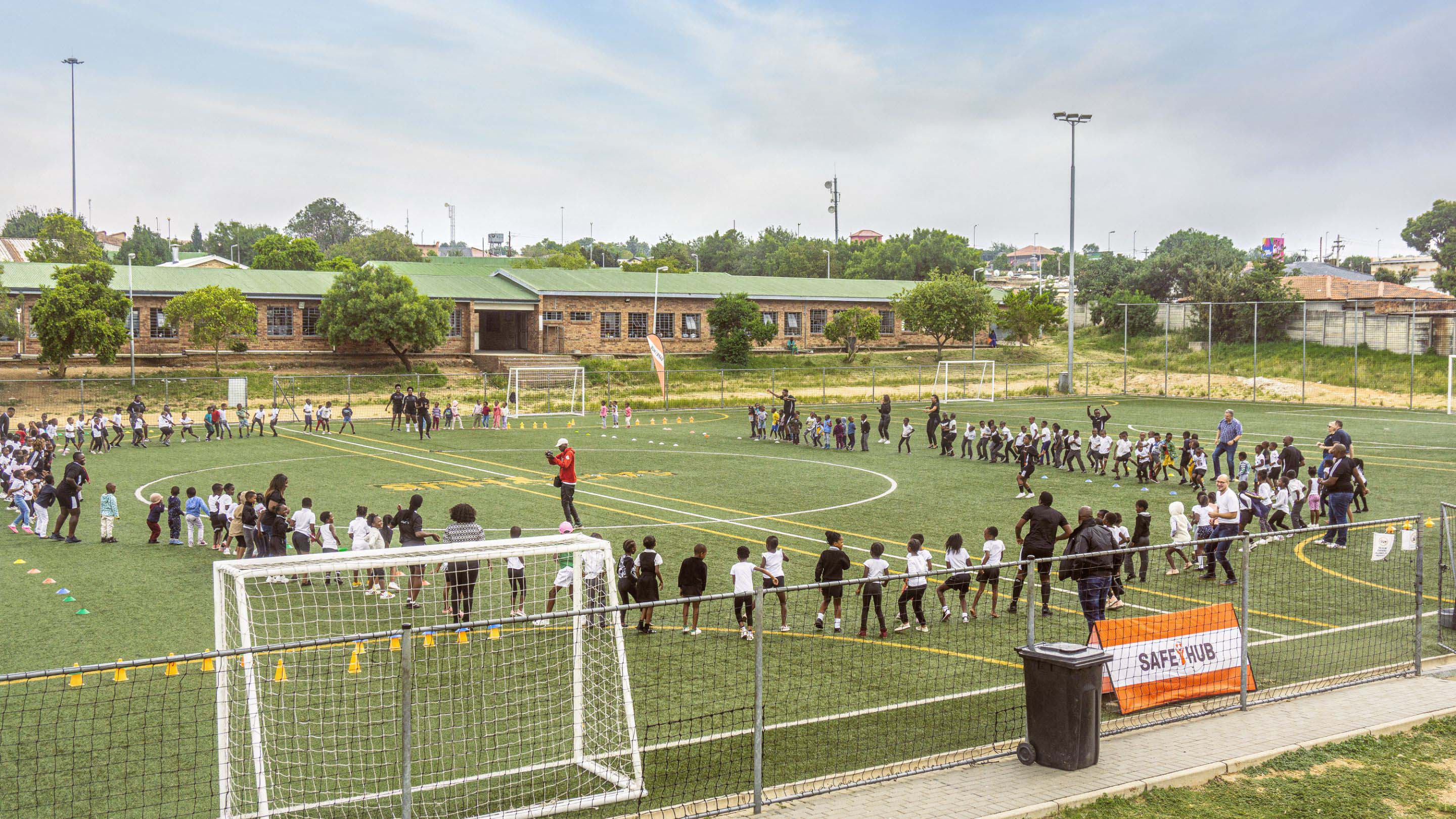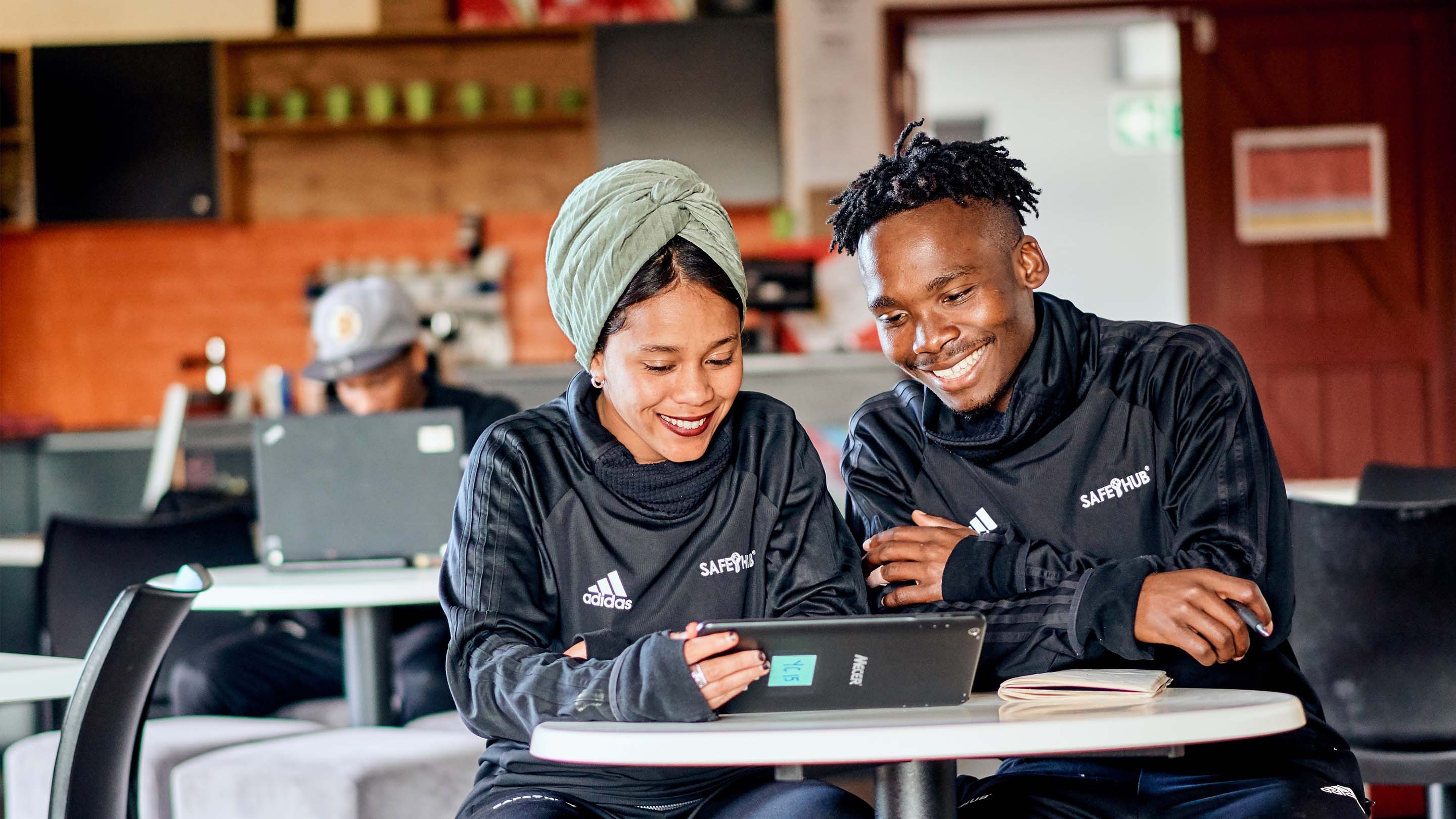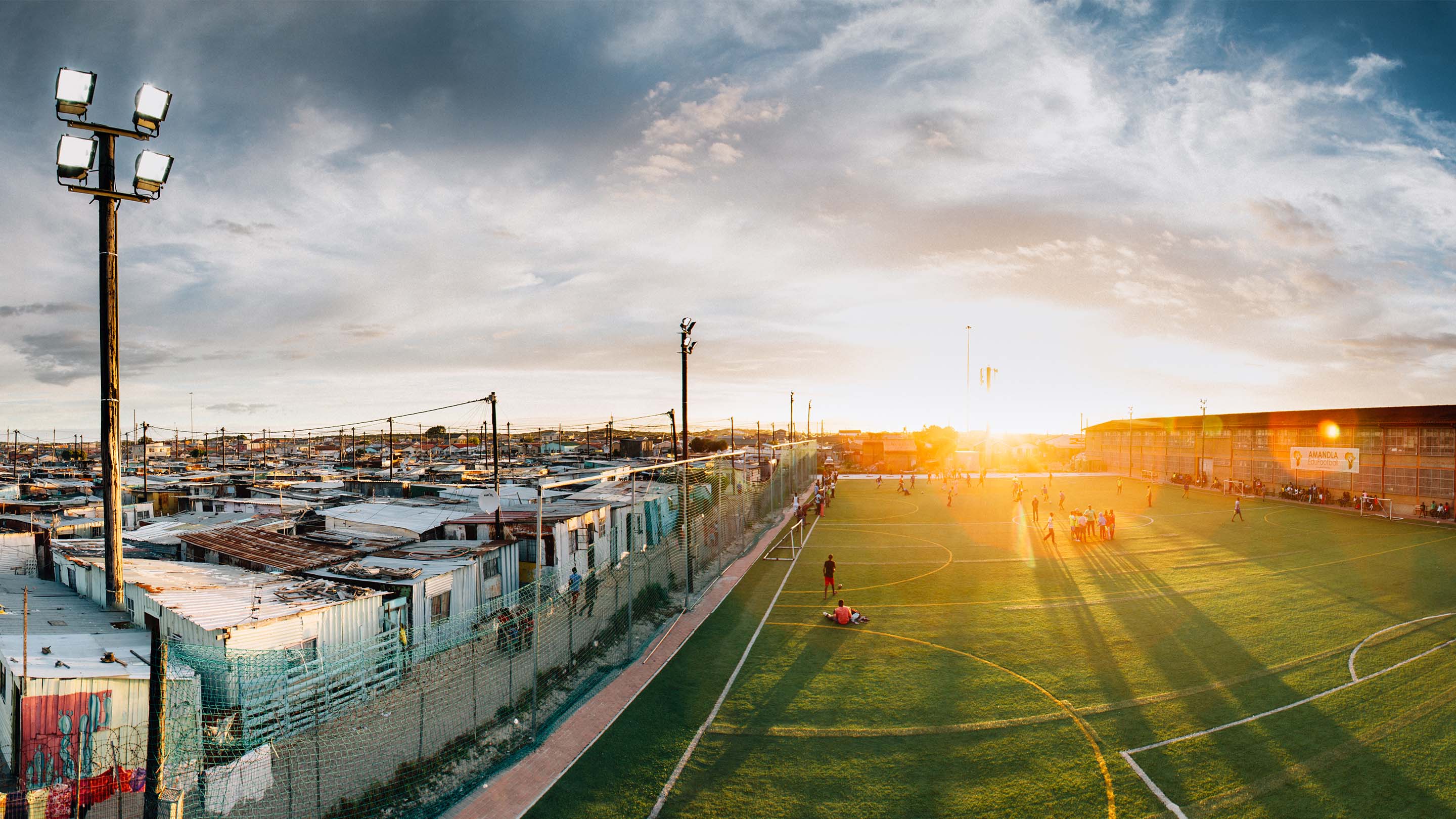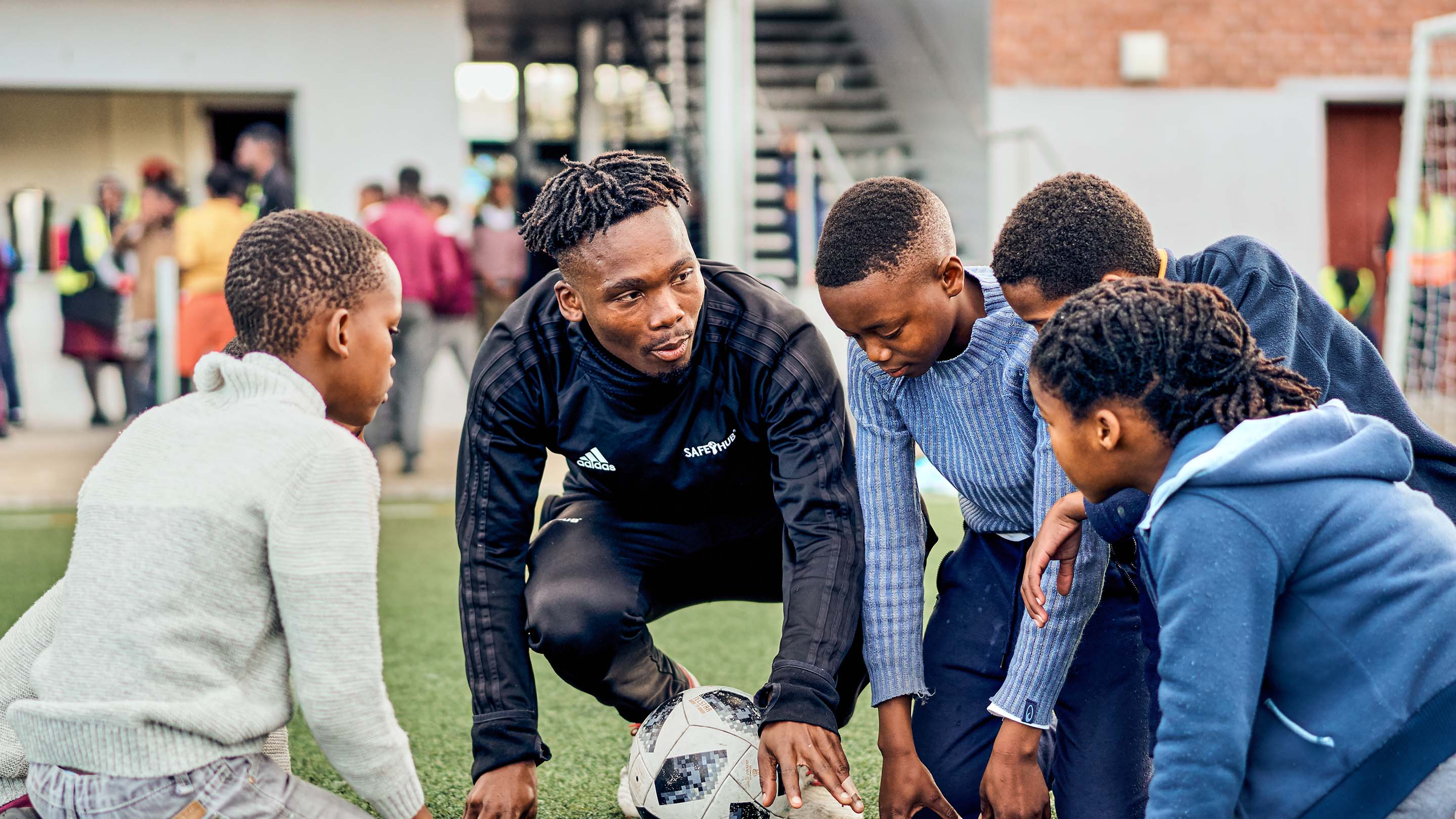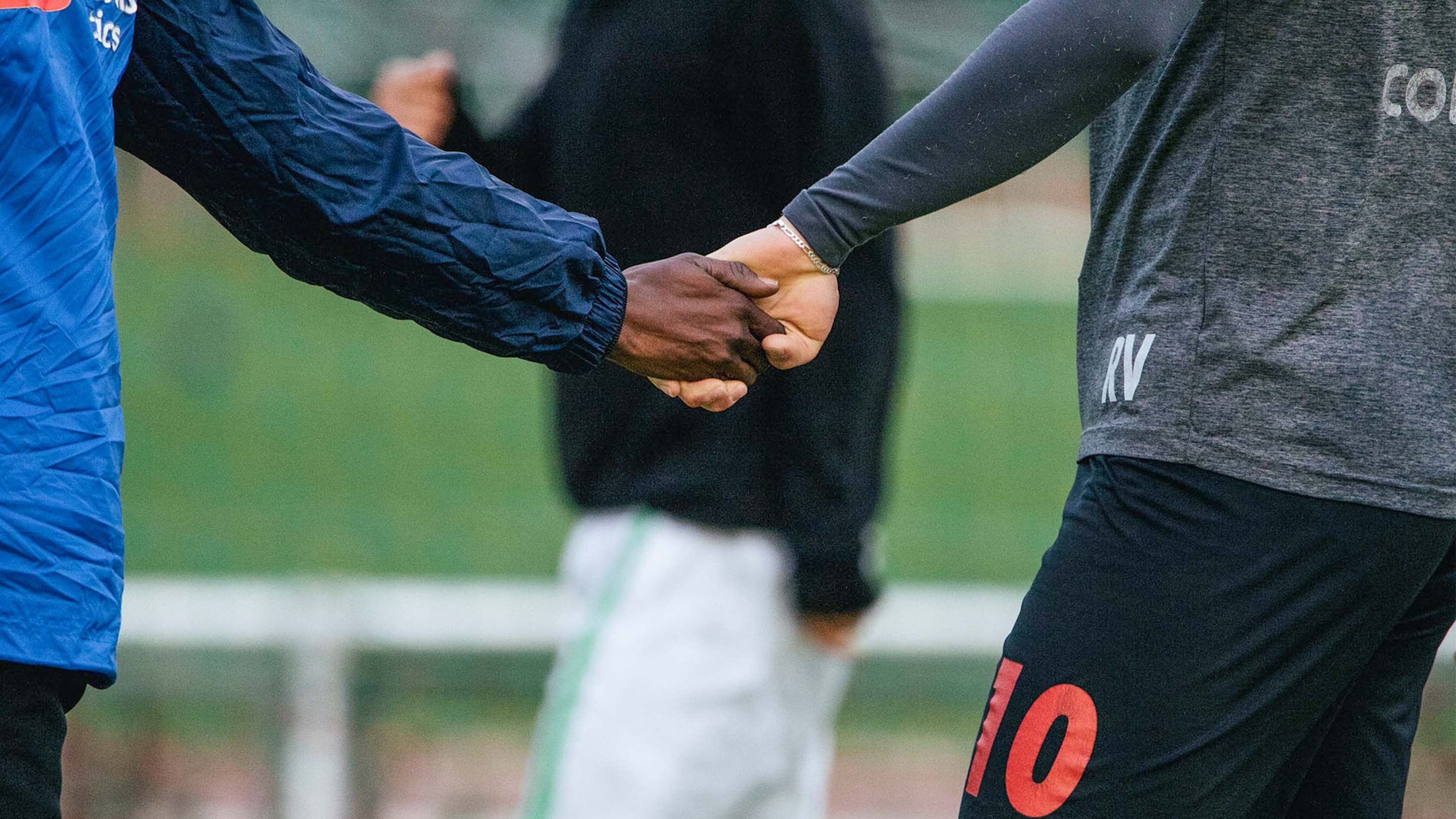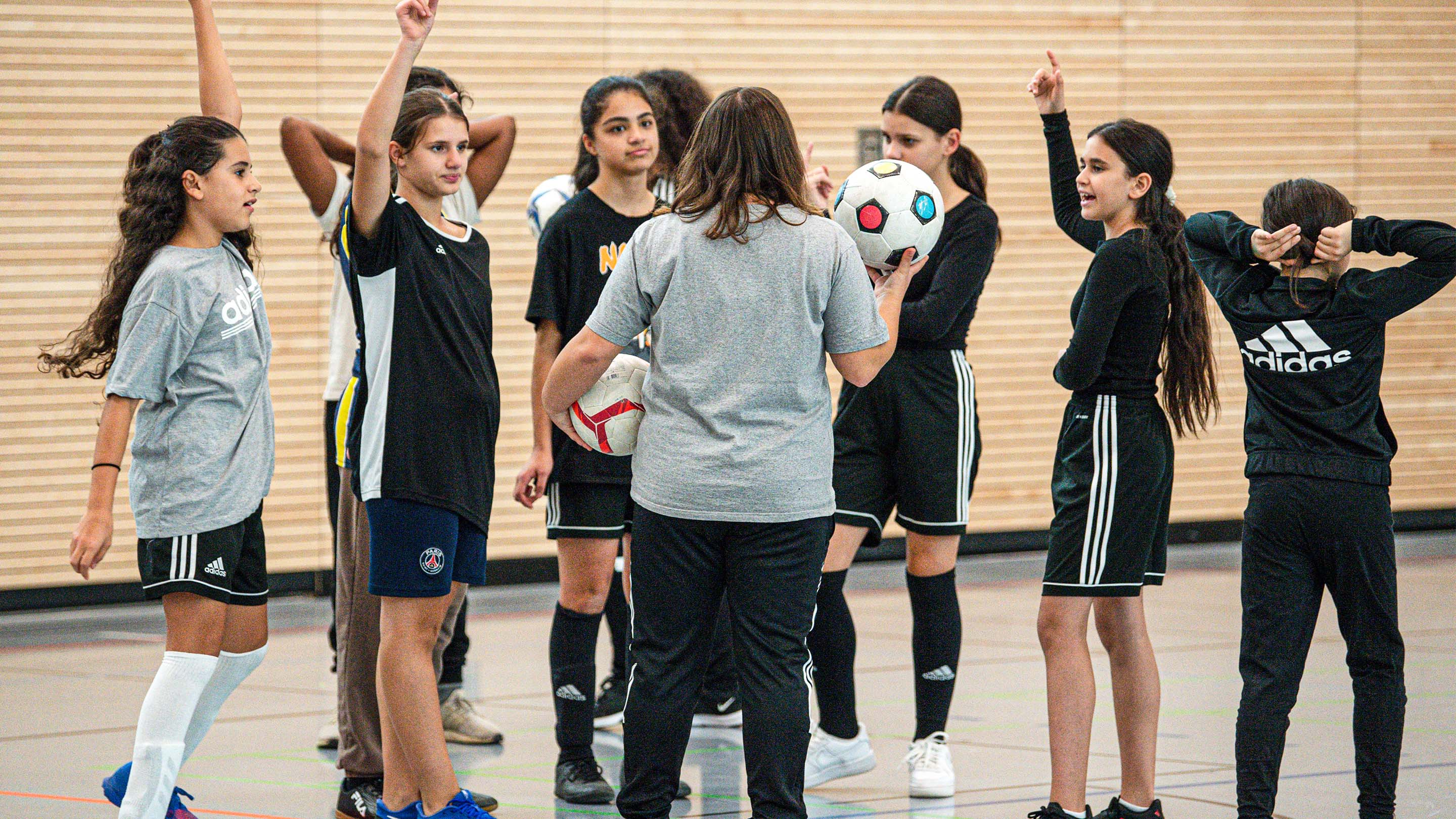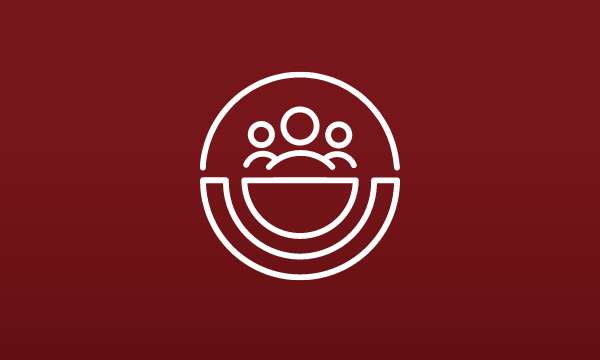
Safe-Hub: Using the Power of Sport and Education to Support Young People
Young people love the EduFootball Programme at Safe-Hub: sports and education provided in a secure setting. Safe-Hub is creating a more equal world by improving young people's access to opportunity in structurally-disadvantaged communities. Developed by AMANDLA Social Enterprises, the Safe-Hub model and its proven impact convinced KBGC to partner with the organisation. Together they formed Safe-Hub Global GmbH with the aim of scaling the model worldwide. Thato, Phemelo and Anna of AMANDLA shared more about Safe-Hub with us. They all agreed: at Safe-Hub, everyone walks off the pitch a winner.
“At Safe-Hub, the world we envision is one where all young people have access to equal opportunities, strive to realize their potential and dare to dream. This vision, and our dedication to realizing it, is a direct response to some of the most urgent challenges our world faces today, including inequality, poverty and unemployment.” This is how Florian Zech, the founder and Managing Director of AMANDLA, describes the driving forces behind the South African NGO. The first Safe-Hub project was set up in 2007 in South Africa. Nine other Safe-Hubs have been added there since then, to which about 30,000 young people have access every week.
What is a Safe-Hub? A Safe-Hub consists of an all-encompassing infrastructure. The infrastructure usually includes a sports field, a youth café, a training academy, a computer lab, cultural workshops, an exercise room, a psychosocial counseling center and office space for social entrepreneurs. Children and adolescents come here to decompress. The key to the program is its holistic focus: Safe-Hubs strive to reach young people, their families, and the local community in nearby townships. The concept has already demonstrated its impact in the areas of violence prevention, education and adolescent employment. Crime plummeted by 44% and high school graduation rates of program participants climbed by 49% in the area around the first Safe-Hub near Cape Town. One study found that the investments made by a single Safe-Hub generated a sixfold social return on investment (600%).
Knorr-Bremse Global Care focuses on strategic partnerships
High impact, efficient use of funding and sustainability are the underlying reasons for the strategic partnerships initiated by Knorr-Bremse Global Care. It’s partner organizations also benefit from the long-term collaboration by strengthening their institutional capacities, among other things. As part of the partnership with AMANDLA, which was initiated in 2014, Knorr-Bremse Global Care has been supporting the construction of the Safe-Hub in Gugulethu-Manenberg (Cape Town) and has been funding the accredited PlayMaker training program conducted by the Safe-Hub in Diepsloot, a township of Johannesburg. Julia Thiele-Schürhoff, Chairwoman of Knorr-Bremse Global Care, said: “We were impressed by the Safe-Hub concept from the very beginning. Children and young people from marginalized families with little access to education and support often find themselves in a vicious circle, with few opportunities for advancement. This strategic partnership enables us to tackle the root causes of structural problems and create better prospects for these people.” As a way of formalizing the strategic partnership, Knorr-Bremse Global Care and AMANDLA set up Safe-Hub Global gGmbH (social enterprise) in July 2021. Julia Thiele-Schürhoff described the organization’s clear goal this way: “Our aim is jointly scale and further develop one of the world’s most impactful youth and community development projects.”
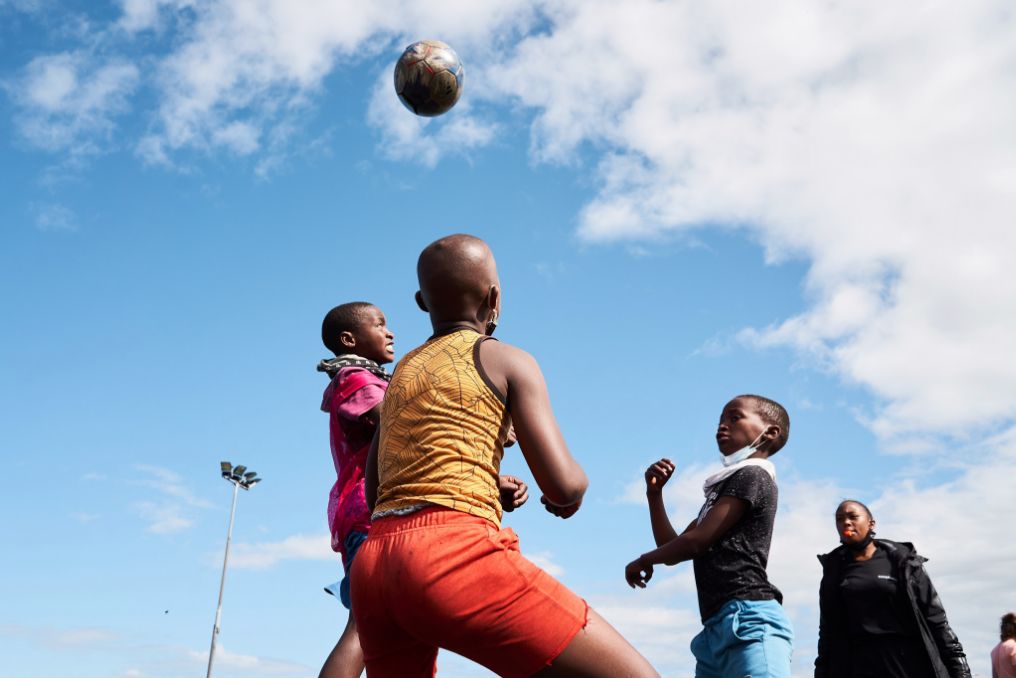
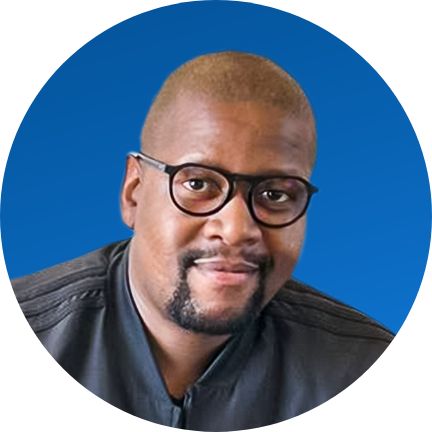
“The children’s worldview is limitless. They are carefree and happy. They enjoy learning through play. They are ambitious and love the Safe-Hub.”Thato Molefe, Facility Manager Safe-Hub Diepsloot, also organizes programs for preschoolers at the Safe-Hub in Diepsloot:
Safe-Hub in Diepsloot: Children love the EduSport Program
The established Safe-Hub in Diepsloot can provide a large number of lessons and best practices for the scaling. Facility Manager Thato Molefe has become an experienced program implementation professional during his seven years on the job. Every day, he looks forward to working with between 120 and 200 participants. When he starts work at 9 a.m., the licensed and passionate soccer coach will be working with soccer teams made up of players from different age groups. Additionally, Thato will encourage young personalities to grow. The Safe-Hub is like an oasis in the middle of Diepsloot, a densely populated, multicultural township with a high crime rate. Thato views the opportunity to work in Diepsloot and help the neighborhood improve and grow as a blessing: “Seeing the positive impact we do on a daily basis energizes me to work even harder for our most important people, the participants.” Soccer is indeed a central activity in the Safe-Hub and is fully inclusive. “We accommodate all who join the Safe-Hub,” Thato says. “In addition to soccer, we offer programs like Girls Fun Tuesday and assist participants with homework assignments.” On Girls Fun Tuesday, girls only do activities they particularly enjoy. These usually include traditional games, water and board games, and social media activities.
The EduFootball Program
One central support program offered by all Safe-Hubs is the three-phase EduFootball Program – soccer as the gateway to education and a personal development. The Safe-Hub also offers an early-childhood development opportunity called the GetInTheGame Program (U6, U8 and U10 players). The next phases for adolescents are GoForIt (life skills) and MakeYourPlay (employment, training education). “From age 17 and up, young people make plans for their future. The MakeYourPlay curriculum shares practical skills and helps young people become employable young adults who contribute positively to society,” Thato says. The MakeYourPlay phase includes the PlayMaker Program. This program includes a 12-month training course for 13 local coaches and prepares participants for work or an apprenticeship program.
First PlayMaker, then Knorr-Bremse South Africa
Phemelo Digopo started off as a PlayMaker in Diepsloot at the beginning of 2021. He has really grown as a coach and moderator since then: “The team environment allowed me to learn how to balance different personalities and also identify my strengths. I have learned how to assert myself.” The PlayMakers receive important job-related know-how, for instance training courses on office data processing and in a job readiness program. Phemelo was one person who was ready for the job market – and this opportunity came to him in the form of the HR colleagues at Knorr-Bremse South Africa. The HR team visited Safe-Hub Diepsloot, got to know Phemelo and recruited him for a one-year training program at Knorr-Bremse in the business administration services unit.
“Phemelo was already a very thoughtful and determined personality when he joined us,” said Heidi Snyman, the Group Head of HR at Knorr-Bremse South Africa. “The PlayMaker Program had already given him the necessary job-related knowledge, including things like data processing and project management. As a former PlayMaker, Phemelo has tremendous soft skills – something that is really valuable for HR.” Phemelo wants to complement and further develop his HR qualifications. To do so, he will be studying HR at the South African College of Applied Psychology. Phemelo also set up his first small event company and is now working to expand this enterprise. He now possesses his own tool box to help underprivileged adolescents gain access to education, qualifications and jobs. “It is a vision I developed while at AMANDLA,” Phemelo said.
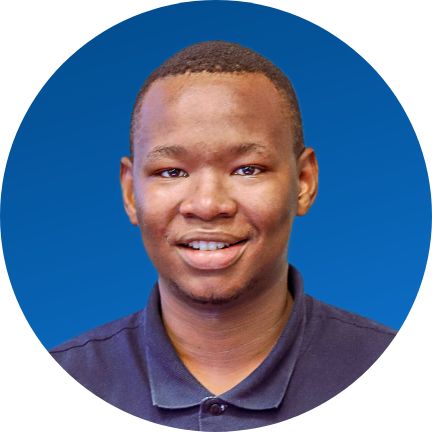
“I get to help individuals better themselves, which for me is heartwarming.”The former playmaker Phemelo Digopo completed an administrative training program at the HR department of Knorr-Bremse South Africa.
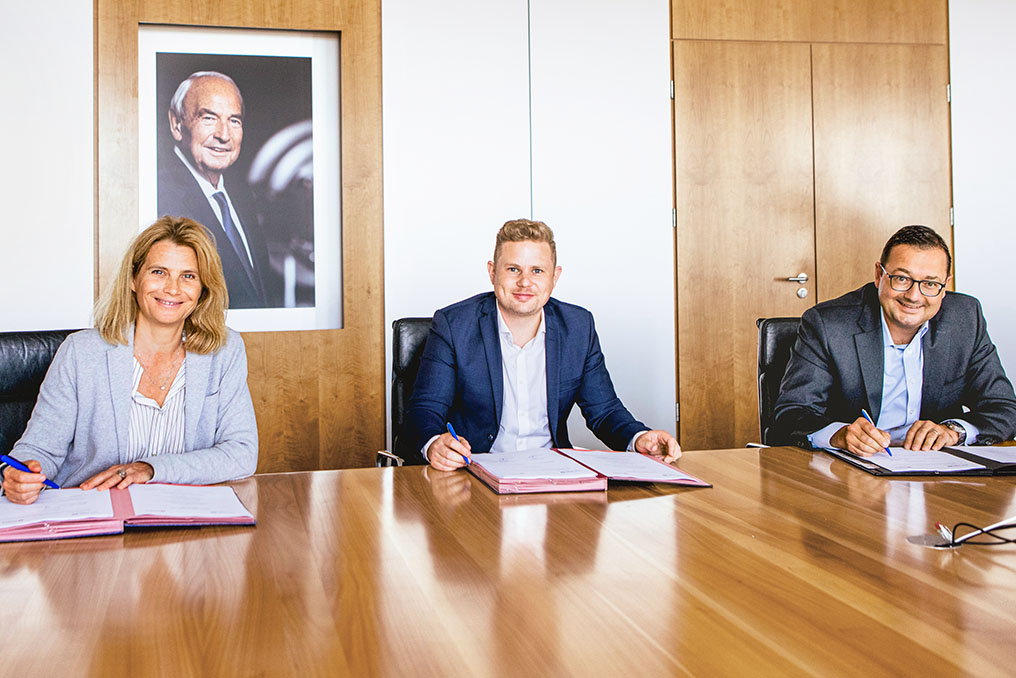
Safe-Hub Global gGmbH:
scaling Safe-Hubs globally
Having achieved success in South Africa, the Safe-Hub concept is now going global with the help of Safe-Hub Global gGmbH. Julia Thiele-Schürhoff wants to share the expertise of Knorr-Bremse Global Care and Knorr-Bremse: “We plan to not only support Safe-Hubs around the world, but also help shape their development. This will improve the long-term opportunities of young people around the world.” Safe-Hub projects are already implemented in Berlin (Germany) and Philadelphia (United States). Like South Africa, Knorr-Bremse sites are not far away from these two Safe-Hubs. Employees of Knorr-Bremse can engage and support when necessary. Florian Zech noted that Knorr-Bremse Global Care works with the South African organization as equal partners: “We are deliberately breaking with the old stigma of NGO on one side and donor on the other. We consult closely with Knorr-Bremse Global Care, which includes potential engagement among Knorr-Bremse employees and the sharing of joint expertise.” The first Safe-Hub infrastructure in the northern hemisphere is scheduled to open in Berlin-Wedding in 2023.
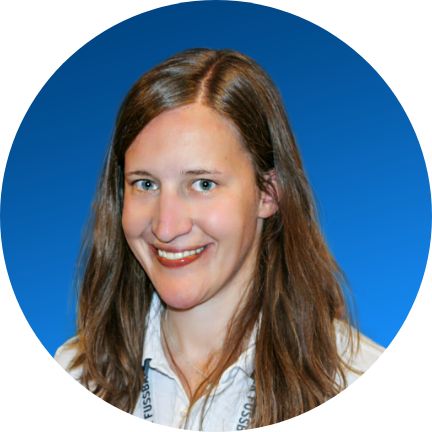
“The EduFootball program developed by AMANDLA teaches the participants not only football skills but also important social skills during training.”Anna Winkler, project manager AMANDLA Berlin, is in charge of the Girls Hub project in Berlin:
Safe-Hub in Berlin about to kick off
The Berlin-based AMANDLA team has been offering programs and services to local young people for the last six years. Later this year, the Berlin-Wedding Safe-Hub infrastructure will be completed. These programs currently comprise train-the-trainer workshops, School-Hubs, Girls Hub and open soccer practices on local athletic fields. A career guidance program for adolescents is planned as well. AMANDLA is currently working with schools to carry out the EduFootball Program or uses public soccer fields. Girls and young women playing soccer are very present in the process, and the GIRLS HUB project makes sure of that. Anna Winkler is the passionate organizer of the program: “Using sports to promote equal opportunity for girls and young women is something that is very close to my heart.” She sees the impact of these programs daily: “In Berlin, the EduFootball Program designed especially for girls helps create more stable, self-confident young personalities who are better able to deal with their emotions and handle setbacks. They bring team play and respectful interaction to life.” Once soccer is over, these skills are not simply left in the dressing room to dry. Rather, they are also applied in the girls’ daily lives and apprenticships.
The development of many young female coaches, those individuals who serve as important role models for the young players, takes a similar path, Anna says: “Two of our trainers were uncertain about their future when they joined us about 18 months ago. They are now completing an apprenticeship as social pedagogical assistants. They also continue to help us out both on and off the pitch.” This fact underscores the strong relationship that participants have with the project in Berlin. It is a positive sign for the future. After all, Safe-Hubs are scheduled to be set up around the world. And, just maybe, we might be able to have a Safe-Hub world soccer championship some day. Or a Safe-Hub mathematical Olympics. Both are possible.
